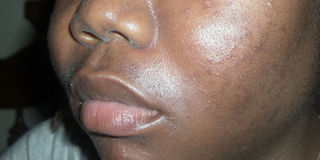Healthy skin starts here

What you need to know:
Eating greasy food has little or no effect on acne according to Ssempereza. Every individual is different and worldwide, different people eat different food yet most suffer from the acne. People should therefore continue with their diets because feeding and acne are not related
Acne is one of the most common skin disorders. Get answers to your questions about what causes acne and how to treat it.
Myths
Eating greasy food has little or no effect on acne according to Ssempereza. Every individual is different and worldwide, different people eat different food yet most suffer from the acne. People should therefore continue with their diets because feeding and acne are not related.
Acne does not appear because the skin is dirty. It is therefore not advisable and inappropriate for one to scrub the face with harsh cleansing soaps and chemicals because this will instead irritate the skin and worsen the acne.
Treatment
All acne cases are different and so are the treatments. Although all acne has its formation in the same process which is hormonal fluctuations that stimulate oil production, not all acne is severe or mild so different types of acne respond to the same types of treatments differently.
“The type of treatment that works for you will depend both on the kind of acne you have, and the additional factors that seem to trigger acne outbreaks,” says Ssempereza.
For some people, acne is a chronic problem which does not go away in a month or two. It is usually a long-term issue that requires acne treatment. This may include benzoyl peroxide, retinoids, antibiotics which may be taken orally or applied to the skin and hormonal treatments.
Prevention
According to Ssempereza, acne is not caused by dirt discourages the use of harsh scrubs. Gently washing your face twice a day is enough. “Too much washing and scrubbing can leave skin irritated and dry, triggering glands to produce more oil, increasing the likelihood of pimples.”
Using the right skin products that will not clog skin pores can help prevent or reduce acne. Choose oil-free products and avoid creams that contain steroids on your face. Reading the labels becomes important before you buy the product. Check for products that have a ‘noncomedogenic’ label.
Popping pimples can drive acne bacteria deeper into the skin. Do not squeeze or prick blemishes because it can lead to more inflammation and permanent scarring leading to black spots on your skin.




